#rilla of ingleside 1921
Text
I want everything—everything a girl can have.
L.M. Montgomery, Rilla of Ingleside (1921)
#be careful what you wish for rilla 💅🏻#i think this is my second favorite book in the series but god i'll always be bitter that anne got such an unhappy ending#i've been salty about it since i was ten#anne of green gables#rilla of ingleside#l.m. montgomery#literature
991 notes
·
View notes
Text
Fairly hyperventilating this fine Sunday afternoon. The L.M. Montgomery Institute continues to bring my soul unfettered joy awareness to access to ‘additive’ books about Maud’s work, and I’m ‘thrilling all over’ to get my hands on this one:
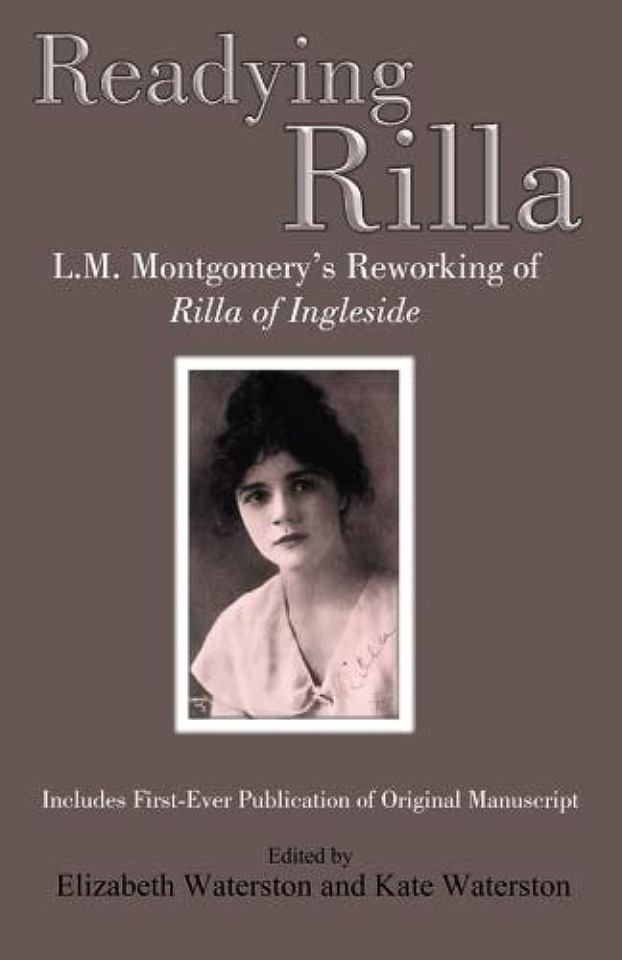
ORIGINAL manuscript, you say? The one that was an untrimmed 518 pages long???? And so I checked the description:
“Rilla of Ingleside, L.M. Montgomery’s 1921 novel about the Canadian home-front during World War I, is both moving and at times very funny. Montgomery’s original handwritten manuscript of 518 pages, along with 71 pages of notes, survives today, housed at the University of Guelph. The manuscript has been painstakingly rendered in a readable format by Kate Waterston, and is available here, with an introduction by Montgomery expert Elizabeth Waterston. This edition enables us to witness the process of Montgomery’s literary refinement as she edited her own work.” READYING RILLA
I wonder if the University of Guelph will let you just touch something (anything!) of Mauds, if you ask nicely enough!
Additionally, Elizabeth H. Waterson is a sweet little angel of a Scholar, with as much love in her her heart for Maud and Mauds work as one can possibly fit in, and she recently celebrated her 101st birthday!
In case anyone else is interested, you may write to her at:
Elizabeth H. Waterston
9436 Trinity Circle
Bradenton, FL 34210
She apparently LOVES to hear from Maud fans, and I’m leaving my house in like ten minutes to go find some extra cute stationary to write her some essentially neurotic fan-mail that’ll probably leave her questioning a public address.
#am i hoping there’s some added walter content to be scared up in this manuscript?#well yeah#👀#rilla of ingleside#lucy maud montgomery#elizabeth waterson
83 notes
·
View notes
Note
Did you say you recently read/re-read Anne of Ingleside? What did you think of it?
Anne of Ingleside marks a change for me in the AoGG series, kind of a "before" and "after" marker. Before, every book focused on Anne's perspective throughout, with the exception of the first. In Anne of Ingleside, the focus of the story begins to shift from Anne herself to her children. Anne still features prominently in the book--unlike say, in Rainbow Valley--but her children get their own voice and narrative attention. This splintered attention only grows more prevalent in the remaining books of Rainbow Valley and The Blythes Are Quoted. (I didn't include Rilla, as Rilla of Ingleside has Anne, but also, it's about Rilla).
The introduction of the children means that much of the plot of Ingleside focuses on Anne's role as a mother and a wife. Looking at goodreads, this rubs a lot of readers the wrong way. Brilliant Anne Shirley, reduced to yet another happy wife happy life stereotype. I don't really agree with this conclusion, but I understand it. While I think choosing motherhood shouldn't be looked down on as a lesser choice, I think it's valid to find it less interesting from an entertainment perspective. (It's also impossible to separate from the historical context flavoring similar stories with "the home is where women belong!" although I don't think we really get that with Anne--in fact Gilbert explicitly acknowledges feeling guilt over the fact that he stole Anne's talent from the world in TBAQ). I also do think complaints of this ilk can be somewhat silly, because LMM novels are romantic slice of life books about young women on PEI in the late 1800s thru early 1900s--what did you expect the book was going to be about? There's a discussion to be had about female characters deserving more than what the time period they were written in afforded them (ie Jo March), but I think LMM does her characters justice most of the time. Anne isn't Emily, and Anne doesn't need to be.
Personally, I find Anne's new stage of life interesting, but I can find the focus on her children boring. Although I love the Blythe children as they grow older, half of them read too similar to Anne in this book for me to care about them as a unique voice (looking at you, Nan and Di). There are moments I do love--the glimpse at Walter's and Gilbert's relationship, Walter helpfully saying "his bottom," (all time favorite LMM moment), Jem flooring a playmate by saying dog's legs are supposed to reach the ground--but squinting at the children-focused parts of the book overall, I can't say they captivate me.
I do, however, love Anne's role as matchmaking matron who provides guidance to her children, the tension between her and Gilbert at the end of the book, Anne laughing at how women flirt with her doctor husband, her and Diana discussing the ups and downs of motherhood (someone here described them as wine moms and I loved it), and overall our look at a more mature Anne. LMM provides an engaging look at an older Anne and Gilbert with her delightful brand of whimsical realism. Sure, Anne and Gilbert got their happily ever after (ish, considering TBAQ and Rilla), but you know, happily every after can put you in a rut, and sometimes it comes with nasty in-laws, and it always comes with great loss to share. I enjoy the continuation of Anne's story; I less enjoy the handing off of the story to her children.
Where Ingleside really shines for me, though, is its foreshadowing. Ingleside was written last of all the Anne books, barring TBAQ (which really isn't an Anne book, but it so directly continues the storylines I count it as one). Rainbow Valley was published in 1919, Rilla was published in 1921 and Ingleside in 1939. That's a pretty significant gap of time, and it shows in Ingleside. As I've written before, WWI is foreshadowed in Rainbow Valley but it's from the perspective of a childhood daydream, albeit a chilling one, about a pied piper. Anne of Ingleside is much more blunt in foreshadowing the war. Diana tells Anne her son wants to be a soldier, and Anne laughs it off and says war is a thing of the past; Anne sees the shadow of the cross over Walter's bed and wonders at it in the future as she grieves; there's our subtle poppy moment, where Walter spills poppies, the symbol of WWI, and Anne muses on how they only have a day to live. Anne of Ingleside reads like one last happy summer day before the long gray winter of WWI, which saves it from being too humdrum a story.
#to be clear I love humdrum stories but lmm's usual strength is writing what could be viewed as humdrum and making it delightful#here it felt more humdrum to me#anne of ingleside#i also do love anne's kids (obviously-as i post again about walter) but I think it's the same deal as Davy in Avonlea#a little goes a long way#especially when it's a variety of kids none of whom have the focus of a full book and who are so little they can all read the same#Anne's kids when older have very distinct personalities but less so when little (just less!!)
23 notes
·
View notes
Text

Read of Rilla of Ingleside by Lucy Maud Montgomery (1921) (277pgs)
3 notes
·
View notes
Text
Which novel tells the story of a young girl who goes to live on a farm in Avonlea, Canada?

'Anne of Green Gables' is a book by Canadian author Lucy Maud Montgomery, published in 1908. Montgomery wrote the book after reading a newspaper article about a couple that was mistakenly sent an orphan girl instead of a boy, yet decided to keep her. The book takes place on a farm in Avonlea, Prince Edward Island, Canada.
Anne Shirley is the name of the 11-year-old orphan sent to live with Marilla and Matthew Cuthbert, unmarried siblings in their fifties and sixties. They had originally wanted to adopt a boy to help run their farm at Green Gables, but they were sent Anne by mistake. Anne is eager to please but has a fanciful imagination. Fortunately, Anne adapts quickly to farm life and her talkativeness brightens up the lives of Marilla and Matthew.
Montgomery wrote eight books about Anne Shirley, beginning with 'Anne of Green Gables'. This was followed by 'Anne of Avonlea' (1909), 'Anne of the Island' (1915), 'Anne's House of Dreams' (1917), 'Rainbow Valley' (1919), 'Rilla of Ingleside' (1921), 'Anne of Windy Poplars' (1936), and 'Anne of Ingleside' (1939). They are not in chronological order but collectively they tell Anne's story from the age of 11 until the age of 53.
Since its publication, 'Anne of Green Gables' has been translated into at least 36 languages and has sold more than 50 million copies. It has been adapted into films and animated and live-action television series.
0 notes
Quote
"I can tell you this Dr. dear," said Susan, pale with wrath, "that Germany is getting to be perfectly ridiculous."
They were all in the big Ingleside kitchen. Susan was mixing biscuits for supper. Mrs. Blythe was making shortbread for Jem, and Rilla was compounding candy for Ken and Walter—it had once been "Walter and Ken" in her thoughts but somehow, quite unconsciously, this had changed until Ken's name came naturally first. Cousin Sophia was also there, knitting. All the boys were going to be killed in the long run, so Cousin Sophia felt in her bones, but they might better die with warm feet than cold ones, so Cousin Sophia knitted faithfully and gloomily.
Into this peaceful scene erupted the doctor, wrathful and excited over the burning of the Parliament Buildings in Ottawa. And Susan became automatically quite as wrathful and excited.
"What will those Huns do next?" she demanded. "Coming over here and burning our Parliament building! Did anyone ever hear of such an outrage?"
"We don't know that the Germans are responsible for this," said the doctor—much as if he felt quite sure they were. "Fires do start without their agency sometimes. And Uncle Mark MacAllister's barn was burnt last week. You can hardly accuse the Germans of that, Susan."
"Indeed, Dr. dear, I do not know." Susan nodded slowly and portentously. "Whiskers-on-the-moon was there that very day. The fire broke out half an hour after he was gone. So much is a fact—but I shall not accuse a Presbyterian elder of burning anybody's barn until I have proof. However, everybody knows, Dr. dear, that both Uncle Mark's boys have enlisted, and that Uncle Mark himself makes speeches at all the recruiting meetings. So no doubt Germany is anxious to get square with him."
"I could never speak at a recruiting meeting," said Cousin Sophia solemnly. "I could never reconcile it to my conscience to ask another woman's son to go, to murder and be murdered."
"Could you not?" said Susan. "Well, Sophia Crawford, I felt as if I could ask anyone to go when I read last night that there were no children under eight years of age left alive in Poland. Think of that, Sophia Crawford"—Susan shook a floury finger at Sophia—"not—one—child—under—eight—years—of—age!"
"I suppose the Germans has et 'em all," sighed Cousin Sophia.
"Well, no-o-o," said Susan reluctantly, as if she hated to admit that there was any crime the Huns couldn't be accused of. "The Germans have not turned cannibal yet—as far as I know. They have died of starvation and exposure, the poor little creatures. There is murdering for you, Cousin Sophia Crawford. The thought of it poisons every bite and sup I take."
"I see that Fred Carson of Lowbridge has been awarded a Distinguished Conduct Medal," remarked the doctor, over his local paper.
"I heard that last week," said Susan. "He is a battalion runner and he did something extra brave and daring. His letter, telling his folks about it, came when his old Grandmother Carson was on her dying-bed. She had only a few minutes more to live and the Episcopal minister, who was there, asked her if she would not like him to pray. 'Oh yes, yes, you can pray,' she said impatient-like—she was a Dean, Dr. dear, and the Deans were always high-spirited—'you can pray, but for pity's sake pray low and don't disturb me. I want to think over this splendid news and I have not much time left to do it.' That was Almira Carson all over. Fred was the apple of her eye. She was seventy-five years of age and had not a grey hair in her head, they tell me."
"By the way, that reminds me—I found a grey hair this morning—my very first," said Mrs. Blythe.
"I have noticed that grey hair for some time, Mrs. Dr. dear, but I did not speak of it. Thought I to myself, 'She has enough to bear.' But now that you have discovered it let me remind you that grey hairs are honourable."
"I must be getting old, Gilbert." Mrs. Blythe laughed a trifle ruefully. "People are beginning to tell me I look so young. They never tell you that when you are young. But I shall not worry over my silver thread. I never liked red hair. Gilbert, did I ever tell you of that time, years ago at Green Gables, when I dyed my hair? Nobody but Marilla and I knew about it."
"Was that the reason you came out once with your hair shingled to the bone?"
"Yes. I bought a bottle of dye from a German Jew pedlar. I fondly expected it would turn my hair black—and it turned it green. So it had to be cut off."
"You had a narrow escape, Mrs. Dr. dear," exclaimed Susan. "Of course you were too young then to know what a German was. It was a special mercy of Providence that it was only green dye and not poison."
"It seems hundreds of years since those Green Gables days," sighed Mrs. Blythe. "They belonged to another world altogether. Life has been cut in two by the chasm of war. What is ahead I don't know—but it can't be a bit like the past. I wonder if those of us who have lived half our lives in the old world will ever feel wholly at home in the new."
"Have you noticed," asked Miss Oliver, glancing up from her book, "how everything written before the war seems so far away now, too? One feels as if one was reading something as ancient as the Iliad. This poem of Wordsworth's—the Senior class have it in their entrance work—I've been glancing over it. Its classic calm and repose and the beauty of the lines seem to belong to another planet, and to have as little to do with the present world-welter as the evening star."
"The only thing that I find much comfort in reading nowadays is the Bible," remarked Susan, whisking her biscuits into the oven. "There are so many passages in it that seem to me exactly descriptive of the Huns. Old Highland Sandy declares that there is no doubt that the Kaiser is the Anti-Christ spoken of in Revelations, but I do not go as far as that. It would, in my humble opinion, Mrs. Dr. dear, be too great an honour for him."
CHAPTER XVIII - A WAR-WEDDING - Rilla of Ingleside
#anne of green gables#anne x gilbert#rilla of ingleside#rilla of ingleside 1921#aogg#aogg 1921#quotes#passages
7 notes
·
View notes
Text
Just give us a film adaptation of Rilla of Ingleside!! We deserve it. We need to see Anne and Gilbert’s children portrayed on screen, WW1 from Rilla’s point of view, we need to see Susan Baker, Miss Cornelia, the Merediths and the beautiful seaside of Glen St Mary.
#rilla of ingleside#anne of ingleside#anne of green gables#aogg#aogg 1921#been reading it lately and it really saddens me that we've never had a film or tv version of the later novels adapted into visual platforms#txt
58 notes
·
View notes
Photo
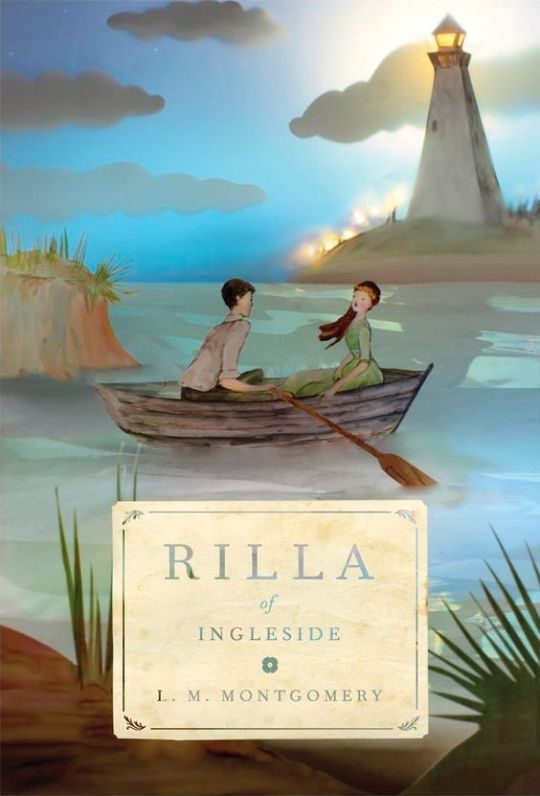
Rilla of Ingleside
L. M. Montgomery
Anne's children were almost grown up, except for pretty, high-spirited Rilla. No one could resist her bright hazel eyes and dazzling smile. Rilla, almost fifteen, can't think any further ahead than going to her very first dance at the Four Winds lighthouse and getting her first kiss from handsome Kenneth Ford. But undreamed-of challenges await the irrepressible Rilla when the world of Ingleside becomes endangered by a far-off war. Her brothers go off to fight, and Rilla brings home an orphaned newborn in a soup tureen. She is swept into a drama that tests her courage and leaves her changed forever.
Published 1921
Read it with Project Gutenberg
Read it with Amazon
Read it with Barnes and Noble
Read it with Apple Books
#book#young adult literature#rilla of ingleside#lm montgomery#rilla#1921#white heroine#heterosexual heroine#15 to 18#death#animal cruelty#drama#19 to 25
1 note
·
View note
Text
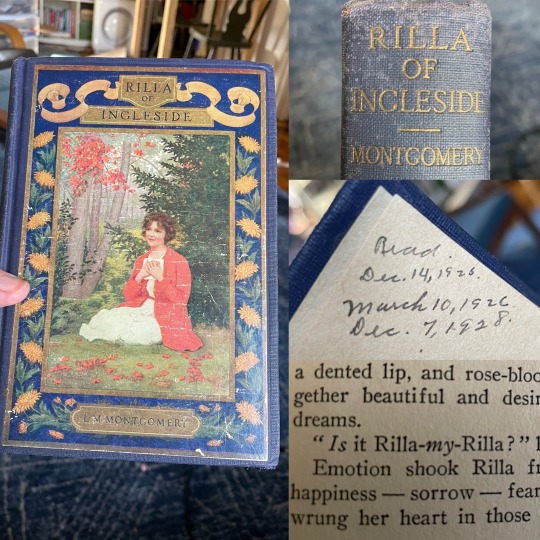
Rilla of Ingleside, first edition 1921
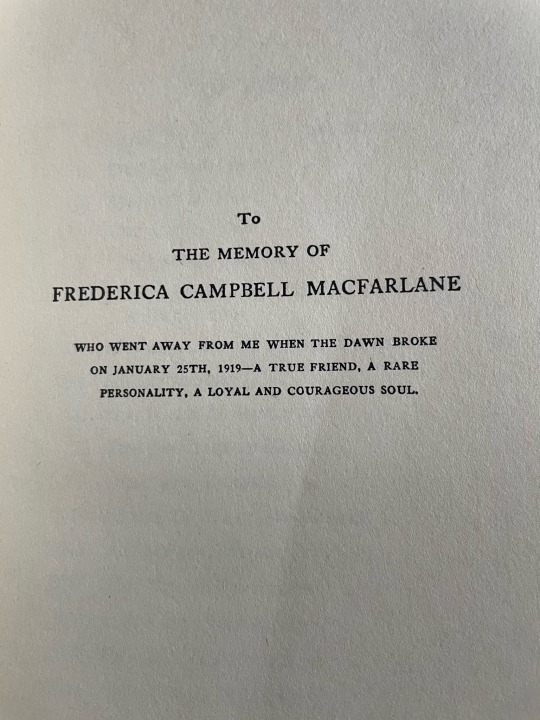
19 notes
·
View notes
Photo

rilla of ingleside (1921) - lucy maud montgomery
“ “
#rilla of ingleside#lucy maud montgomery#i am so goddamn funny#please tell me this is funny to someone else#my sense of humour is broken#anyway#blackout poetry#blackout poem#author#book#poetry
346 notes
·
View notes
Text
She's like a tea rose. There's a wonderful fineness and firmness under all that shy, wistful girlishness of her.
L.M. Montgomery, Rilla of Ingleside (1921)
#walter you can't just say things like this about your secret best girl and then just up and go to france#especially when NO ONE leaves the somme alive#i know wwi gets lost in the shuffle but literally everyone knows that!#anne of green gables#rilla of ingleside#l.m. montgomery#literature
592 notes
·
View notes
Note
Thoughts on Readying Rilla? Any good nuggets? Surprises?
I have been choke sobbing (this is not an exaggeration) for days trying to get through this! Because, Walter. 🥺 I’ll make a proper informative post when I’ve finished reading it and share what I’d guess most people will find interesting, but for now, here’s the biggest highlights/things that have stuck out!
Ken Ford’s middle name is, presumably, Selwyn. He was initially referred to as Selwyn all over the first manuscript before Maud went back, and crossed it all out in favour of Kenneth. (This is obv occasionally in Montgomery’s nature, to have people go by their middle names, and also have a surname as a middle name, like Walter Cuthburt Blythe.)
Di Blythe’s happy ending was an engagement to a foreign soldier overseas. She wrote to Anne about it. (This was crossed out but remained in the notes, likely an omission for word count?)
The girl on the cover is Rilla from ‘Montgomery’s own eyes’ in the same way Evelyn Nesbit is Anne. In Maud’s own copy of the 1921 edition of RoI, this picture was discovered; it was a newspaper clipping that Maud cut out and wrote ‘Rilla’ on. The girl remains unidentified!
Walter’s last letter to Rilla. Ya’ll, the first draft Maud has was so painful for me. She crossed out things that… were certainly meaningful, and also shift the perspective a little. Sharing more on this after the cut!
Anyone who has read the RoI chapter “And so, good-night” will be prepared to remember that the night before Walter went over the top, he heard the Piper. This is hard enough to swallow. What follows in bold is what Maud has kept in the book we all have and the italics is what was redacted:
“Rilla, I tell you I saw him - it was no fancy - it was no illusion. I heard his music and it was all I could do to prevent myself from rushing after him. I wanted to follow him - (…)”
Okay. Are you crying about the implications here? I was. I am. 🥺 I still need some time to sit with it.
Another spot that hurts? His mentions of Una. In the original Last Letter, he mentions thinking of Una’s eyes. Let’s quote again here, same formula as before:
“To-morrow when we go over the top, I’ll think of you both — of your laughter Rilla-my-Rilla, and the steadfastness of Una’s blue eyes – somehow I see her very plainly to-night, too.”
In the existing RoI book, instead of ‘her’ he saw only ‘those eyes.’ Here’s the edit demonstrated in Readying Rilla: (apologies for the colour here, I’ve only got an LED lamp to read by at the moment)

If Montgomery had left it as Walter seeing a manifestation of her fully … Una would have joined the ranks of both Rilla and Ingleside, which Walter wrote earlier in the same Last Letter that somehow they both were vividly close to him that night. That he could see them clearly, like it or she was right before him. Adding Una to that list… the significance can’t be overlooked. 😭 It’s so weighty.
I’m just in a total slump over it. 😭 (I generally try avoid RoI overall because it makes my heart and head and eyes hurt.)
#this has been wrecking me#BACK TO REGULAR POSTING after this depressive literary episode passes lol#the lol here serves as a cry for help#walter please 🥺
26 notes
·
View notes
Text








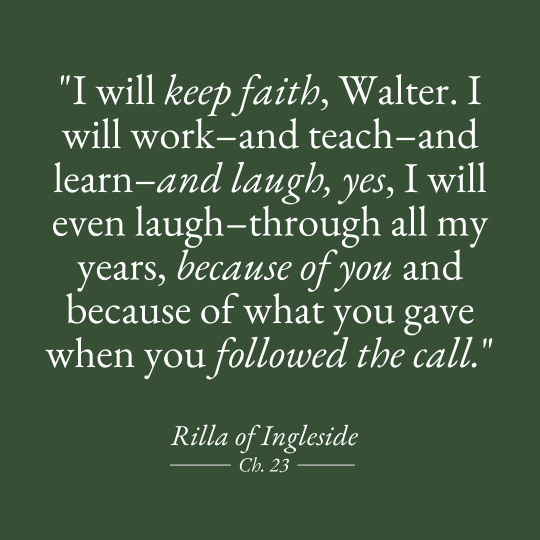

Having lived through the Great War only a few years prior, L. M. Montgomery penned Rilla of Ingleside in 1921 with a powerful poignancy that still immerses readers in the pain and tragedy of the time as if it were their own.
Here are 9 important quotes from the book, compiled in honor of Veterans Day.
#rilla of ingleside#wwi#world war i#war#the great war#history#canadian history#world history#war history#veterans day#veterans day 2021#remembrance day#armistice day#historical fiction#powerful quotes#sad quotes#quotes#quoteblr#anne of green gables#rilla blythe#walter blythe#l m montgomery#lucy maud montgomery#l. m. montgomery#classic literature#classic books#typographyedit#typography#canadian literature#book quotes
27 notes
·
View notes
Text
Rilla of Ingleside
Presented by Voices of Today
Produced by Susan Iannucci
First published in 1921, Rilla of Ingleside is the eight book in the Anne of Green Gables series. It is WWI, and Canada has entered the war. Young men enthusiastically join up; mothers and sweethearts stay behind and fill the jobs that once were only for men. The Canadian view of the war and the US president is unique and is revealed…
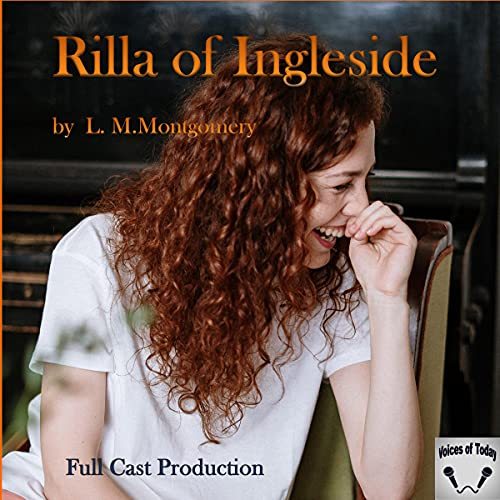
View On WordPress
#Denis Daly#Jennifer Fournier#Karen Commins#Ken Foster#Marty Krz#Maureen Boutilier#Robin Siegerman#Sarah Bacaller#Susan Iannucci
0 notes
Text
The body grows slowly and steadily but the soul grows by leaps and bounds. It may come to its full stature in an hour.
-L. M. Montgomery, Rilla of Ingleside (1921)
#this is a very accurate way of describing the feeling of getting older and maturing and I love it#mine#mood#quote
0 notes
Quote
"Knitting is something you can do, even when your heart is going like a trip-hammer and the pit of your stomach feels all gone and your thoughts are all catawampus."
"Rilla of Ingleside", L.M. Montgomery, 1921
332 notes
·
View notes